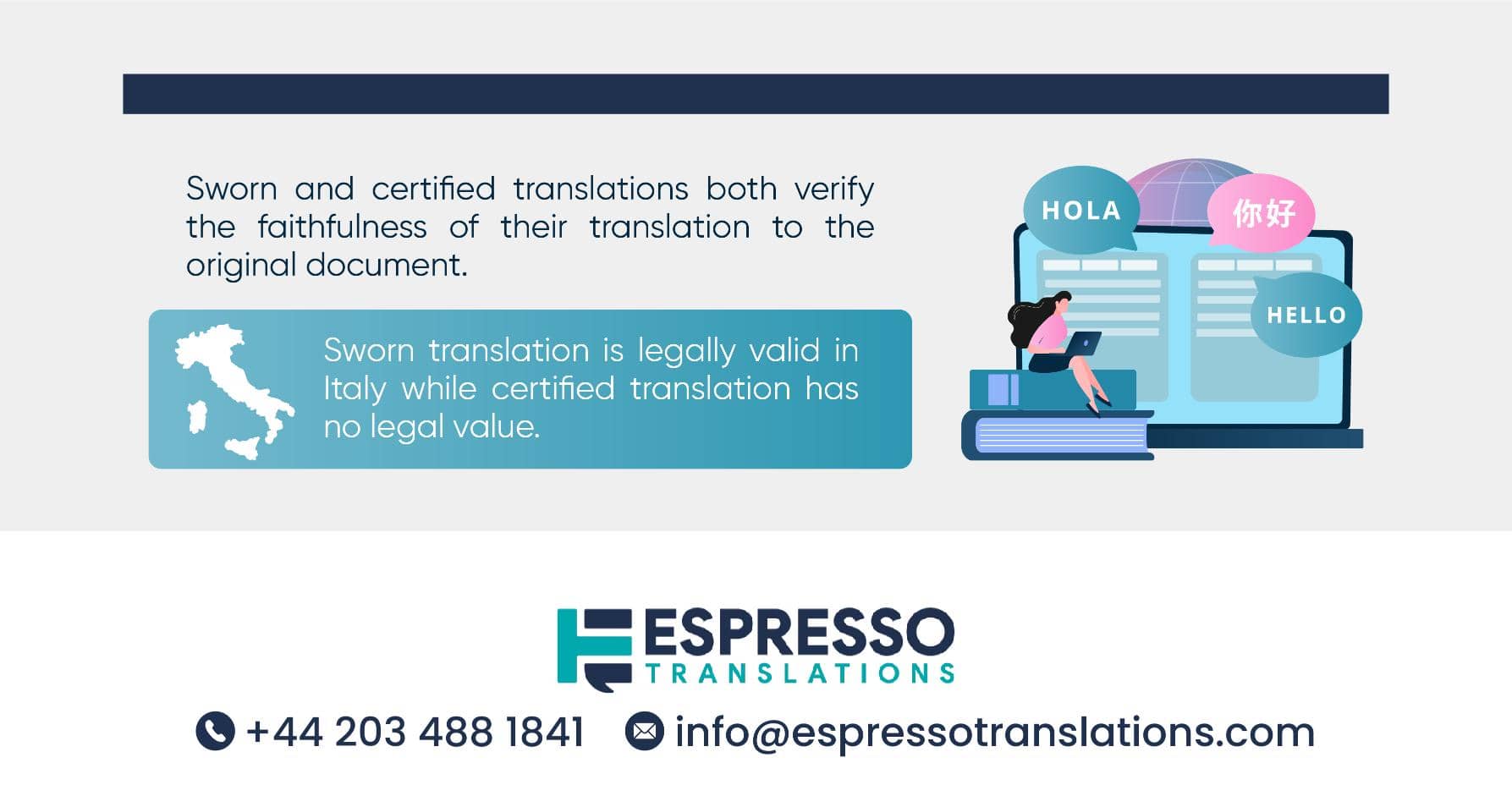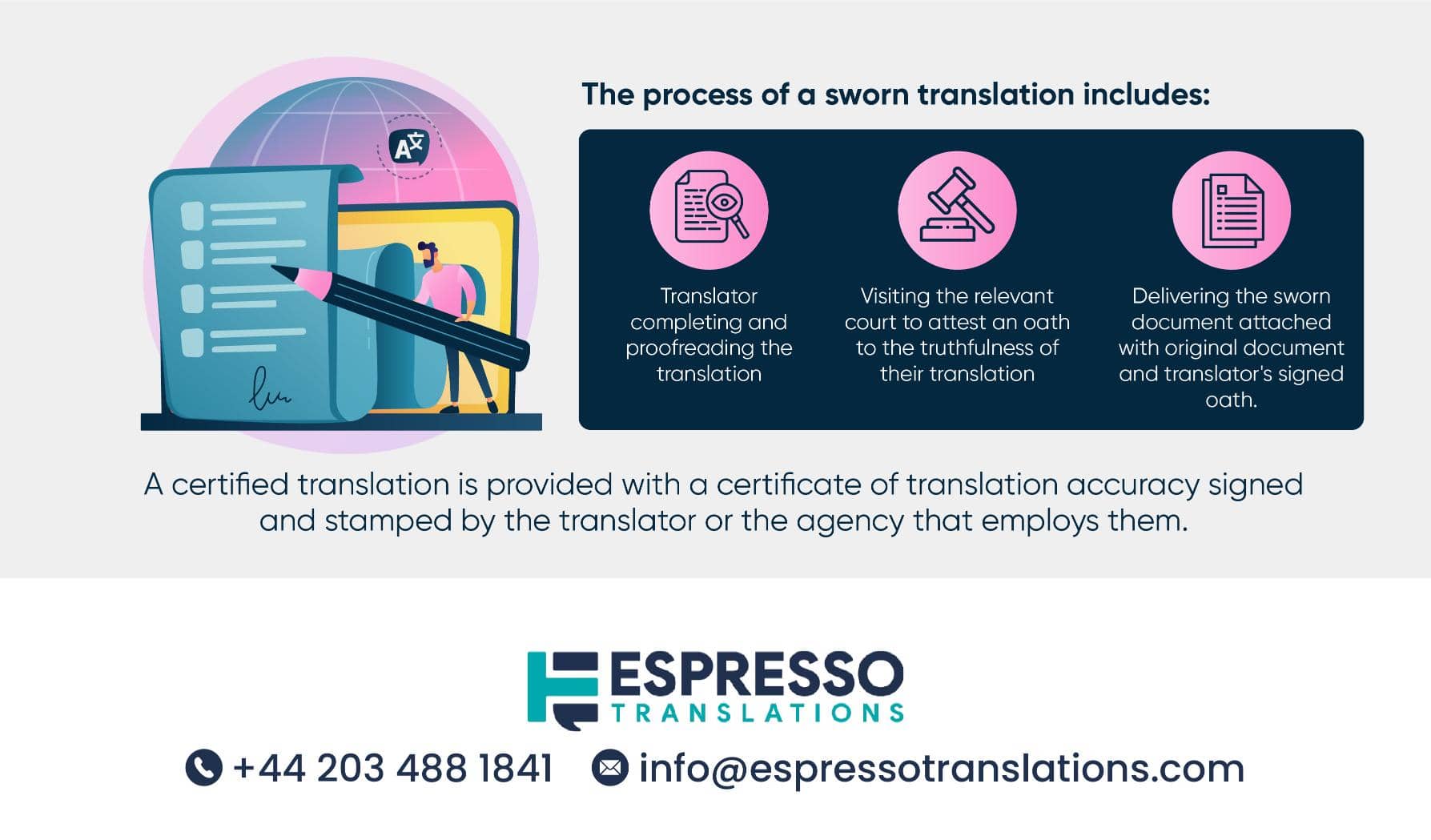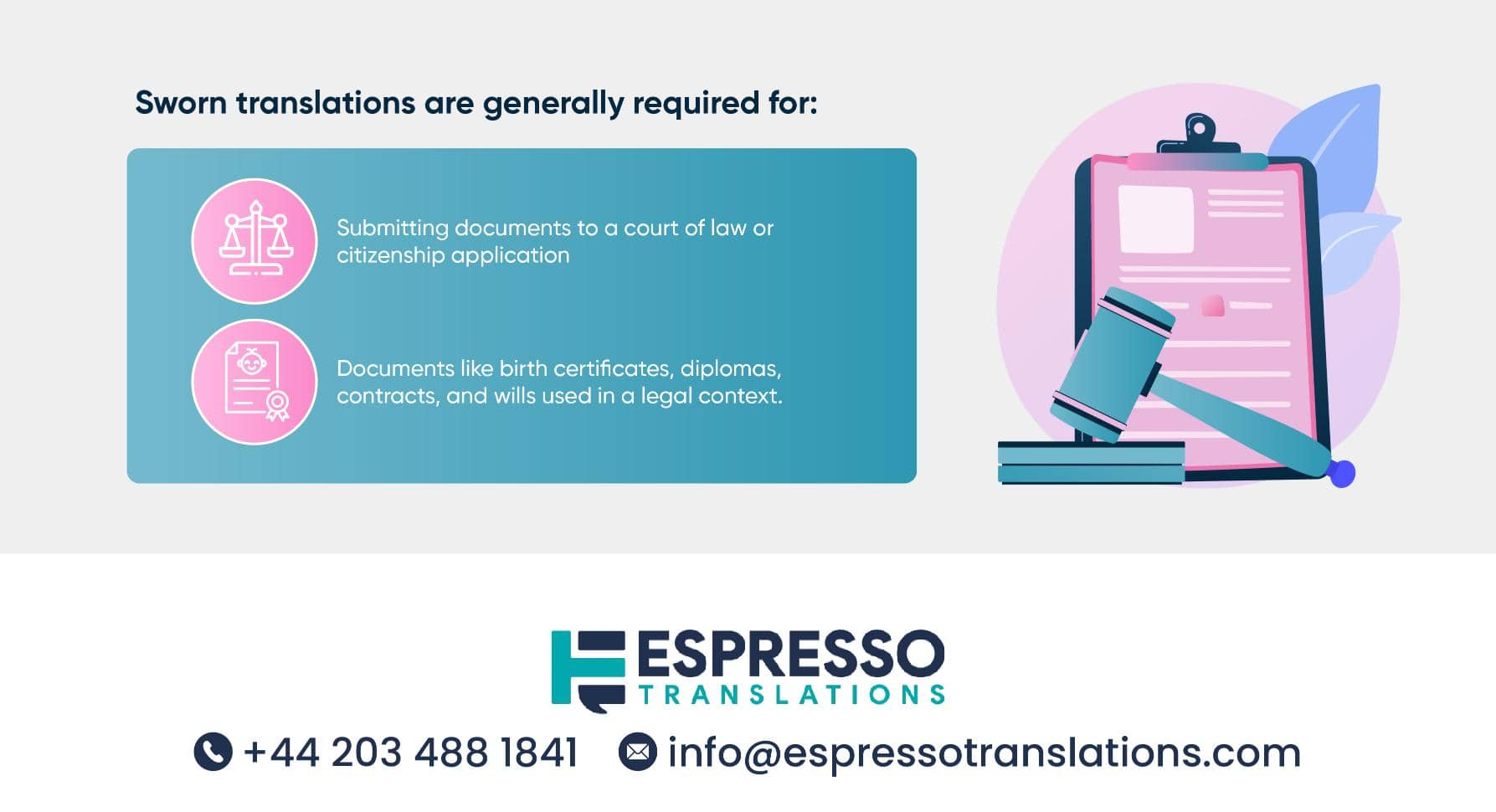If you have ever needed a translation for official use, you may have been asked if you need a sworn or certified translation. Understanding the differences between a sworn translation and a certified translation is crucial if you need to file legal or medical documents or civil records for any kind of official procedure. The key to the issue is knowing where the translated document will be used and for what purpose. Requirements are different in different countries, especially where legal matters are concerned. The US Citizenship and Immigration Services (USCIS), for instance, may require certified translations of documents, while officials in Italy will insist on a sworn translation as a measure of the credibility of the translation.
Both a certified and a sworn translation attest to the faithfulness of the translation to the original document, but in Italy only a sworn translation is legally valid. In the United States, on the other hand, sworn translations are seldom required, but official documents should get certified translations in order to be accepted.
This article will help you understand the differences between sworn and non-sworn translations so that you can make the best choice when finding document translation services. Read on to learn which type of translation best suits your needs and how to tell when you need a sworn or certified translation service.
Is a certified translation the same as a sworn translation?

Both are performed by translators who take personal responsibility for the accuracy and completeness of their translations, but there are crucial differences beyond that.
A certified translation of a document is supplied with an affixed certificate of translation accuracy, or CTA. A CTA is a statement that the translation is accurate and faithful to the original document, and the translator (or the agency that employs them) signs and stamps the statement to take responsibility for the translation.
This statement always includes the translator’s or translation agency’s contact information. It lists the translator’s qualifications, and it should be printed on letterhead in the target language of the translation. Unlike a sworn translation, however, the certified translation may not be the legal equivalent of the original.
In Italy, certified translations do not have legal value, but in some English-speaking countries, such as the United Kingdom, United States, Australia, and Canada, they are the accepted standard when translating diplomas, certificates, corporate documents, and so on, as they act to certify the accuracy of the information in the translated documents. Certified translations are also required for translated documents submitted to the USCIS in the United States.
In Italy, however, for a translation to hold legal value, it cannot be certified, but rather must be done by a translator or agency specializing in sworn translations. This means that, in Italy, only a sworn translation holds legal value and can be used as an official document. Sworn translations are required when submitting documents to a court of law or when submitting a citizenship application. A sworn translation is also required for documents like birth certificates, diplomas, contracts, or wills that will be used in a legal context. Examples of documents used in Italy that are acceptable with a certified translation are manuals, business documents, advertisements, and internal communications—none of which need to be legally valid.
The difference between a sworn translation and a certified translation lies mainly in the legal validity of the translation, and this depends on the purpose for which it will be used and the place where it will be used for that purpose.
Look at the differences between the two types of translations in the table below.
| Certified Translation | Sworn Translation |
|---|---|
| Done by a professional translator who takes responsibility for accuracy | Often provided by an official translator registered with a court or a chamber of commerce |
| Is accompanied by a certificate of accuracy | Its authenticity is sworn to in court |
| Has no legal value | Has legal value |
| Does not require stamp duty | Requires stamp duty |

What qualifies as a certified translation?
A certified translation is a translation with a signed, stamped, and dated declaration of accuracy and fidelity to the original document (Certificate of Translation Accuracy, or CTA) attached by the translator. A certified translation is an assurance that the document is an accurate representation of the original that was translated by a certified professional. This type of translation is often done for documents that do not need a sworn legal declaration; these may include diplomas, user manuals, and corporate documentation.
A certified document translation can only be done by a specialized translator who signs and authenticates the document and provides a Certificate of Translation Accuracy. We recommend hiring a professional translation service for such projects. The cost will be determined based on the length of the document, the required turnaround time, and the complexity of the document.
Also Read: What is a certified translation for USCIS? What you need to know
When do I need a certified translation?
Ask for a certified translation for documents like diplomas, academic certificates, and personal or commercial records that require a certification of accuracy but not a legal attestation. You should note that in some countries, only a certified translator can provide a certified translation.
Here are three examples where certified translations can be useful:
- Academic records: To ensure recognition by international educational institutions, get a certified (in other words, reliably accurate) translation of your diploma or other academic certificates.
- Business agreements: A precise translation of contracts (or documents to incorporate a company) is crucial when doing business across borders.
- Personal documents: For processes like moving abroad or applying for citizenship in another country, get certified translations of any personal supporting documents you will need.
Whichever type of legal translation you need, you can trust Espresso Translations not just to complete the project properly and on time, but also to provide advice as needed to ensure success.
What is a certified public translator?
Only a qualified and specialized translator can handle certified translations. This translator must have the skills and professionalism to ensure accuracy, clarity of language, and usage of the correct terminology in the relevant field. This translator must make certain that the certified translation is in line with the purposes and content of the original document.
What are the rules for certified translation?
You should work with a professional translator or a specialized translation agency when you need a certified translation. With a certified translation, a translator who guarantees the accuracy and authenticity of the translated text provides a signed statement to this effect. Certified translations have to include this statement and the seal of a sworn translator.
This type of translation is often required for translations of official documents such as diplomas, contracts, corporate documentation, etc., particularly for official use in the United States. Translated patent certificates and documents should also be certified.
How much does a certified translation cost?
The cost of a certified translation may vary depending on the source and target languages, the number of words or pages in the document, the presence of any special formatting, and the required deadline. When you need the document certified, the certification fee will generally vary between $20 and $50 per page unless the document is quite technically challenging or the turnaround time is very short. Always ask for an exact quote on your project before giving the go-ahead so that there are no surprises later.
At Espresso Translations, our pricing policy is consistent and transparent. Get a quote on your project today.
What is the meaning of sworn translation?
A sworn translation is completed by a professional translator who swears an oath as to its accuracy and legal legitimacy before a relevant court or authority. Sworn translations are usually not required in the United States, the United Kingdom, or Australia, but they may be required for legal or official documents, such as birth certificates, marriage certificates, diplomas, contracts, court judgments, etc., in certain other countries.
Like certified translations, with sworn translations the translator is responsible for the completeness and precision of the translation. A sworn translation is further certified by a public authority like a court to give it legal value, a formality that involves paying a stamp duty (tax). With both types of translation, the statement is attached to the translation and signed by the translator; the difference lies in the legal validity of the oath swearing process.
Also Read: What is a sworn translation?
What is the process for a sworn translation?
First the translator completes the translation and proofreads it. Next, that translator visits the court with relevant jurisdiction to swear an oath as to the truthfulness of their translation and the conformity of the translation to the original text. In Italy, this oath is sworn under penalty of perjury before a Chancellor of the Sworn Translations Office of the Court or a Justice of the Peace. The sworn document package delivered to the customer will include a copy of the original document in the source language, the translation in the target language, and the translator’s signed oath as recorded before the public official overseeing the process. Everything must be stapled together to demonstrate that it constitutes a single document.
The court stamps the pages of this document (the translation plus the oath record) and applies a $16 revenue stamp to every fourth page (for example, to page 1, to page 5, and so on). The prepared package is then registered in the court as an official piece of evidence. In the translation industry, this type of translation is a guarantee of its legal validity.
To summarize, a sworn translation is a translation required for legal documents that need to be submitted in court or in an official context. A certified translation, on the other hand, can be used for non-legal purposes, although it still calls for a careful and professional translation.
When do I need a sworn translation?
When you have legal documents like birth or marriage certificates, judicial rulings, or administrative reports that need to be presented in a foreign country, you will probably need a sworn translation.
Whenever you are required to submit personal or commercial documents to foreign courts or government agencies in another country, getting a sworn translation is a way to provide a guarantee of the accuracy and truthfulness of the translation.
If you plan to study abroad or apply for citizenship in another country, institutions may require sworn translations of your diplomas, certificates, and identification documents. If you are an American planning to visit Italy, for instance, you will need to get your documents translated into Italian, and getting sworn translations is vital to getting them officially recognized as legally valid for the Italian government.
Sworn translations are also required for legal documents used in cross-border business transactions and international contracts. Be sure to get sworn translations whenever you need legal or business assistance in another country so that the recipient can trust that the documents were properly translated.

What is the purpose of a sworn translation?
A sworn translation is a legal measure that places the civil and criminal responsibility for the translation’s accuracy and faithfulness on the translator. The translator takes on this responsibility by swearing an oath in a court of law or before a notary public, stating that the translation is an authentic representation of the original document. This is called a “sworn statement” or an “oath certificate,” and the certificate is attached to the translated document. A translation cannot be called sworn if it does not have such a statement attached.
A sworn translation is what gives a translated document its credibility as a legal document when it is submitted to a court or authority in a different country. This is most essential when filing official documents.
The extra time and established contacts with officials that are required when a translator creates a sworn translation is why an extra charge is asked for this service. This is well worth paying for when important documents are at stake in completing international procedures. The sworn translation shows that this formal process has been completed.
What is a legally sworn translator?
Some countries or other jurisdictions keep an official register of translators who can provide sworn translations. Italy is one country that does not maintain a Register of Translators to vouch for the qualifications and skills of individual translators. This is why some courts require that translators be registered with the Chamber of Commerce (CCIAA) in Category XXII (Miscellaneous Activities), Sub-category 1 (Foreign Languages – Translators and Interpreters) or in the CTU Registry (Office Technical Consultants). Other courts do not require mandatory registration with the Chamber of Commerce or the CTU Registry since, with the certification, the translator assumes full responsibility for the translated content, both civilly and criminally.
A person who can act as a sworn translator is essential in transforming foreign language documents into legally valid documents in Italy in such a way that the meaning and integrity of the original text are preserved.
If you need a sworn translation for use in Italy, you should definitely take the time to hire a document translation service with a solid certification statement, such as Espresso Translations. Our professional team of expert translators has the skills and knowledge to create legally valid sworn or certified translations.
How do I get a sworn translation of a document?
The process for a sworn translator involves taking official responsibility for the completeness and accuracy of each translation they perform. A sworn translator is a professional who may be registered with the Chamber of Commerce, CTU, or other authorities to provide official translations. In any case, sworn translators must visit the relevant certification office to create a statement confirming the accuracy of their translation in the presence of a public official. When the translator has taken an oath over the statement, the translation can be called a sworn translation. This type of translation is required for the translation of legal documents issued by foreign authorities or those that need to have legal validity, such as documents to be presented in an Italian court.
For you as a consumer who needs a sworn translation for legal documents, however, the steps are relatively simple: just contact a reputable translation agency or individual translator with a proven history of providing sworn translations and request this service. Espresso Translations is a good place to launch this process with a free quote.
What are the requirements for sworn translation?
A sworn translation requires a highly skilled linguist with expertise in local laws who has sworn an oath before a legal authority that their translation is accurate and faithful to the original document. The United States and the United Kingdom do not have a central registry of sworn translators, so you must rely on the translator’s good reputation for thorough, competent work. In European countries like Italy, Spain, France, and Germany, the national governments or court systems can award certification for this type of work, usually after the translator passes an examination.
Regardless of the translator’s certification, all sworn translations must include the authentication step wherein the translator swears an oath before a local court official or notary public. This sworn statement, complete with the translator’s signature and seal, must be attached to the translation. Without this statement, a translation cannot be a sworn translation with legal validity.
FAQ
Certified or Sworn Translation: What Do I Need For My Project?
Sworn translations are done by a translator who may be registered with the Chamber of Commerce or the Register of CTU, and the oath of accuracy is taken before a justice of the peace or a chancellor of the court. This oath swearing is necessary when translated official papers like judicial or administrative documents need to have legal validity.
A certified translation has a certificate of authenticity that is a guarantee of translation quality without having legal value attached to it. What’s the difference? Unlike sworn translations, certified translations are not the legal equivalent of the original document.
Certified translations are more typically accepted for official use in the United States, but you should always clarify what is needed in your particular case.
Sworn translations are typically used for documents submitted for official purposes, as they guarantee the authenticity and legal validity of the translation. Contact Espresso Translations today for sworn translation services you can trust.
What is the meaning of official translation?
The phrase “official translation” indicates a certified, notarized, or legalized translation of a document. The translation will be completed by a skilled official translator who examines the document in question, creates equivalent wording in the target language, then attests to the accuracy and authenticity of the translation by signing, stamping, and dating a certificate of validity.
Getting an official translation from a professional translation company is recommended for legal or administrative purposes like submitting court documents or obtaining visas or work permits abroad.
Now that you know the differences between notarized, certified, and sworn translation, if your documents need to be translated, the helpful team at Espresso Translations is ready to get your project started. Get a free quote today.
What is the difference between certified and sworn translators?
A highly qualified professional translator may be able to provide either type of service. When you need translation services, you must be sure to determine what is required for your procedure and then ask the translator for the proper service. The translator then needs to include the correct type of supporting documentation with the translation: either a statement from the translator as to its accuracy, or a sworn oath as to the fidelity of the translation.
The main difference between sworn and certified translations is the legal validity they hold: a certified translation will be fully complete and accurate, but only a translation certified by a sworn translator can be considered a legal document for certain official purposes.

